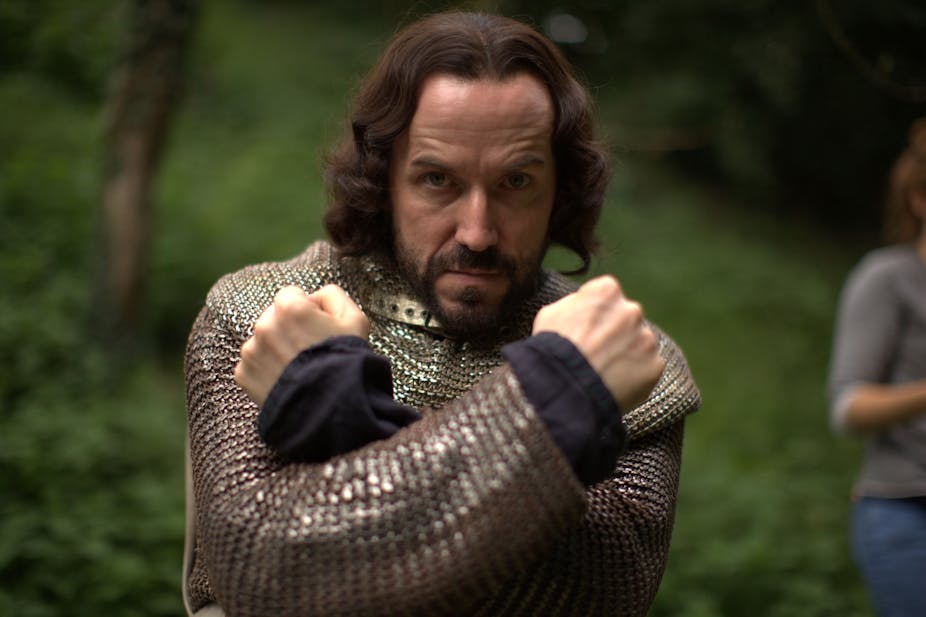The British Library has just staged an exclusive one-day exhibition. The four earliest surviving copies of the original Magna Carta were brought together for an audience of 1,215 people, selected by public ballot. The BBC, meanwhile, have brought the theme of King John and Magna Carta to a different, wider, and predominantly younger audience. The Horrible Histories team is back, in style.
Fans of the series know what to expect here, with all the boxes ticked when it comes to burping, farting, vomiting, gags (good, bad, and ugly) and plenty of violence to boot.
A lot is certainly packed in. We hear about John’s lousy reputation before he became king. His father, Henry II is said to have jokingly nicknamed him Lackland at a time when there was seemingly no inheritance for his youngest son, and this prompts quite a laugh.
There’s a reference to Gerald of Wales’s tale that the teenage John pulled the beards of the Irish chieftains when sent to Ireland in 1185. Whether or not this actually happened, the expedition was generally deemed a disaster. And too good a story to pass up.
We learn of John’s coronation in 1199, before digressing to earlier events in the Holy Land. Here, we meet a caricature of Saladin and the Battle of Hattin, which paved the way for the fall of Christian-held Jerusalem in 1187, and prompted men like Richard the Lionheart to go on crusade.

Luxury and kingship
John’s taxation of his subjects is to the fore. We are told:
He lived a life of luxury,
That’s what his tax was for
Well, not really. Most of John’s revenue raising was intended to raise sums to pay for an army (primarily mercenaries) to retake the lands he had lost in France. But it’s true he didn’t get very far with the cash he gained.
Besides, medieval writers tended to understand that kings needed to be seen to be rich. John’s son and successor, Henry III, was even criticised, by the 13th century monk and chronicler Matthew Paris, for attempted austerity:
The lord king, shamelessly departing from his father’s [John’s] footsteps, ordered the expenses of his court and the customary pleasures of hospitality to be cut back, even so as to incur the reproach of inexcusable avarice.
That said, Horrible Histories shows an eye for finer detail. John did travel his kingdom extensively, changing location, on average, once every three days across a reign of over 17 years. And the royal household did include people specifically responsible for the king’s bed, bath and toilet.
Magna Carta, 1215
And then the famous events at Runnymede in 1215 come to the fore. The barons declare that they have “written a list of grievances … for the Magna Carta” because they’re “really ticked off, big time”. Here, we might note that the document was not initially thought of as “Magna Carta”. The barons themselves drew up a list known as “the articles of the barons”. The name Magna Carta was not applied until 1217, to distinguish what remained of the charter of liberties agreed at Runnymede from a separate document relating to the Royal Forests.
Debate about the content of what became Magna Carta takes the form of a rap battle. Why not? Initially, they avoid the time-honoured misconception that King John “signed” Magna Carta in the way we today would sign a letter, document, or cheque. The barons demand the king to “hit it with your seal and give us our rights”.
The effect, however, is somewhat spoilt by a baron waving a quill pen as if to sign the document spread on the table. Later, in John’s interview with Death, there are repeated references to Magna Carta as a “piece of paper” signed by the king. The comic effect of John comparing it to toilet-roll fits the style of the programme. Yet this was a document drawn up on parchment and authenticated by the addition of the king’s seal, not by him signing his name.
Although humour is at the fore, there is nonetheless emphasis on the overall significance of Magna Carta: “For the first time in history, the king had to follow the law.” The balance of fundamental rights a king should guarantee, alongside clauses linked to matters of immediate grievance, is shown in the line:
There’s vital stuff here that you’ve got to give us.
There’s also some stuff about fishing in the rivers.
The last part here is an allusion to the removal of fish-weirs (to quote Magna Carta itself) “from the Thames and the Medway and throughout all England, except on the sea-coast”.
A birthday
But above all the greatest triumph of the programme lies in conveying the history of Magna Carta since John’s reign in a whistle-stop tour of 800 years of history, set to a reworking of The Proclaimers’ I’m Gonna Be (500 miles). As the team tell us:
Magna Carta
It’s a parta
What you’re taught at school
Music – a much under-rated means of learning – here sums up, in about three minutes, what might take hours in the schoolroom, and volumes of academic books. Horrible Histories successfully conveys the significance of their theme:
And I would say 800 years,
A birthday worth 800 cheers
Since 1215 Magna Carta’s been
The foundation of our democracy …And I would hope 800 years
Of freedom never disappears
All hale this simple ancient law
May it survive 800 more!
Cheers to that.

